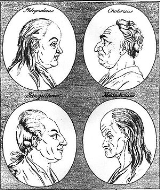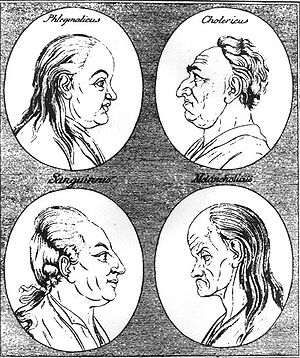
Humours comedy
Encyclopedia
The comedy of humours refers to a genre
of drama
tic comedy
that focuses on a character
or range of characters, each of whom has one overriding trait or 'humour
' that dominates their personality and conduct. This comic technique may be found in Aristophanes
, but the English
playwright
s Ben Jonson
and George Chapman
popularized the genre in the closing years of the sixteenth century. In the later half of the seventeenth century, it was combined with the comedy of manners
in Restoration comedy
.
 In Jonson’s Every Man in His Humour
In Jonson’s Every Man in His Humour
(acted 1598), which made this type of play
popular, all the words and acts of Kitely are controlled by an overpowering suspicion that his wife is unfaithful; George Downright, a country squire, must be "frank" above all things; the country gull in town determines his every decision by his desire to "catch on" to the manners of the city gallant.
In his Induction
to Every Man out of His Humour
(1599) Jonson explains his character-formula thus:
The comedy of humours owes something to earlier vernacular comedy but more to a desire to imitate the classical comedy of Plautus
and Terence
and to combat the vogue of romantic comedy
, as developed by William Shakespeare
. The satiric purpose of the comedy of humours and its realistic method lead to more serious character studies with Jonson’s The Alchemist
. The humours each had associated physical and mental characteristics; the result was a system that was quite subtle in its capacity for describing types of personality.
Genre
Genre , Greek: genos, γένος) is the term for any category of literature or other forms of art or culture, e.g. music, and in general, any type of discourse, whether written or spoken, audial or visual, based on some set of stylistic criteria. Genres are formed by conventions that change over time...
of drama
Drama
Drama is the specific mode of fiction represented in performance. The term comes from a Greek word meaning "action" , which is derived from "to do","to act" . The enactment of drama in theatre, performed by actors on a stage before an audience, presupposes collaborative modes of production and a...
tic comedy
Comedy
Comedy , as a popular meaning, is any humorous discourse or work generally intended to amuse by creating laughter, especially in television, film, and stand-up comedy. This must be carefully distinguished from its academic definition, namely the comic theatre, whose Western origins are found in...
that focuses on a character
Fictional character
A character is the representation of a person in a narrative work of art . Derived from the ancient Greek word kharaktêr , the earliest use in English, in this sense, dates from the Restoration, although it became widely used after its appearance in Tom Jones in 1749. From this, the sense of...
or range of characters, each of whom has one overriding trait or 'humour
Humorism
Humorism, or humoralism, is a now discredited theory of the makeup and workings of the human body, adopted by Greek and Roman physicians and philosophers, positing that an excess or deficiency of any of four distinct bodily fluids in a person directly influences their temperament and health...
' that dominates their personality and conduct. This comic technique may be found in Aristophanes
Aristophanes
Aristophanes , son of Philippus, of the deme Cydathenaus, was a comic playwright of ancient Athens. Eleven of his forty plays survive virtually complete...
, but the English
England
England is a country that is part of the United Kingdom. It shares land borders with Scotland to the north and Wales to the west; the Irish Sea is to the north west, the Celtic Sea to the south west, with the North Sea to the east and the English Channel to the south separating it from continental...
playwright
Playwright
A playwright, also called a dramatist, is a person who writes plays.The term is not a variant spelling of "playwrite", but something quite distinct: the word wright is an archaic English term for a craftsman or builder...
s Ben Jonson
Ben Jonson
Benjamin Jonson was an English Renaissance dramatist, poet and actor. A contemporary of William Shakespeare, he is best known for his satirical plays, particularly Volpone, The Alchemist, and Bartholomew Fair, which are considered his best, and his lyric poems...
and George Chapman
George Chapman
George Chapman was an English dramatist, translator, and poet. He was a classical scholar, and his work shows the influence of Stoicism. Chapman has been identified as the Rival Poet of Shakespeare's Sonnets by William Minto, and as an anticipator of the Metaphysical Poets...
popularized the genre in the closing years of the sixteenth century. In the later half of the seventeenth century, it was combined with the comedy of manners
Comedy of manners
The comedy of manners is a genre of play/television/film which satirizes the manners and affectations of a social class, often represented by stock characters, such as the miles gloriosus in ancient times, the fop and the rake during the Restoration, or an old person pretending to be young...
in Restoration comedy
Restoration comedy
Restoration comedy refers to English comedies written and performed in the Restoration period from 1660 to 1710. After public stage performances had been banned for 18 years by the Puritan regime, the re-opening of the theatres in 1660 signalled a renaissance of English drama...
.

Every Man in His Humour
Every Man in His Humour is a 1598 play by the English playwright Ben Jonson. The play belongs to the subgenre of the "humours comedy," in which each major character is dominated by an overriding humour or obsession.-Performance and Publication:...
(acted 1598), which made this type of play
Play (theatre)
A play is a form of literature written by a playwright, usually consisting of scripted dialogue between characters, intended for theatrical performance rather than just reading. There are rare dramatists, notably George Bernard Shaw, who have had little preference whether their plays were performed...
popular, all the words and acts of Kitely are controlled by an overpowering suspicion that his wife is unfaithful; George Downright, a country squire, must be "frank" above all things; the country gull in town determines his every decision by his desire to "catch on" to the manners of the city gallant.
In his Induction
Induction (play)
An Induction in a play is an explanatory scene or other intrusion that stands outside and apart from the main action with the intent to comment on it, moralize about it or in the case of dumb show to summarize the plot or underscore what is afoot. Inductions are a common feature of plays written...
to Every Man out of His Humour
Every Man Out of His Humour
Every Man out of His Humour is a satirical comedy written by English playwright Ben Jonson, acted in 1599 by the Lord Chamberlain's Men. It is a conceptual sequel to his 1598 comedy Every Man in His Humour...
(1599) Jonson explains his character-formula thus:
Some one peculiar quality
Doth so possess a man, that it doth draw
All his affects, his spirits, and his powers,
In their confluctions, all to run one way.
The comedy of humours owes something to earlier vernacular comedy but more to a desire to imitate the classical comedy of Plautus
Plautus
Titus Maccius Plautus , commonly known as "Plautus", was a Roman playwright of the Old Latin period. His comedies are the earliest surviving intact works in Latin literature. He wrote Palliata comoedia, the genre devised by the innovator of Latin literature, Livius Andronicus...
and Terence
Terence
Publius Terentius Afer , better known in English as Terence, was a playwright of the Roman Republic, of North African descent. His comedies were performed for the first time around 170–160 BC. Terentius Lucanus, a Roman senator, brought Terence to Rome as a slave, educated him and later on,...
and to combat the vogue of romantic comedy
Shakespearean comedy
In the First Folio, the plays of William Shakespeare were grouped into three categories: comedies, histories, and tragedies."Comedy", in its Elizabethan usage, had a very different meaning from modern comedy...
, as developed by William Shakespeare
William Shakespeare
William Shakespeare was an English poet and playwright, widely regarded as the greatest writer in the English language and the world's pre-eminent dramatist. He is often called England's national poet and the "Bard of Avon"...
. The satiric purpose of the comedy of humours and its realistic method lead to more serious character studies with Jonson’s The Alchemist
The Alchemist (play)
The Alchemist is a comedy by English playwright Ben Jonson. First performed in 1610 by the King's Men, it is generally considered Jonson's best and most characteristic comedy; Samuel Taylor Coleridge claimed that it had one of the three most perfect plots in literature...
. The humours each had associated physical and mental characteristics; the result was a system that was quite subtle in its capacity for describing types of personality.

